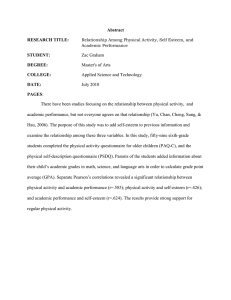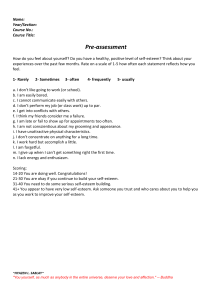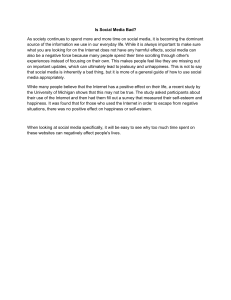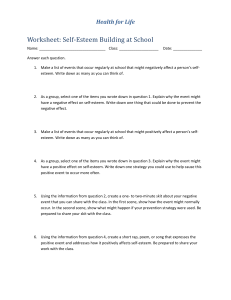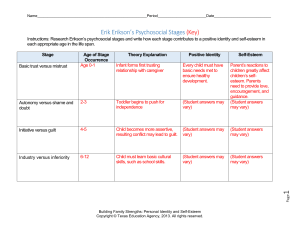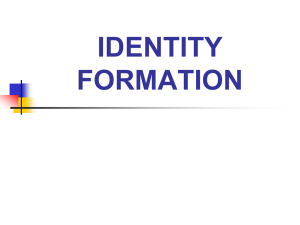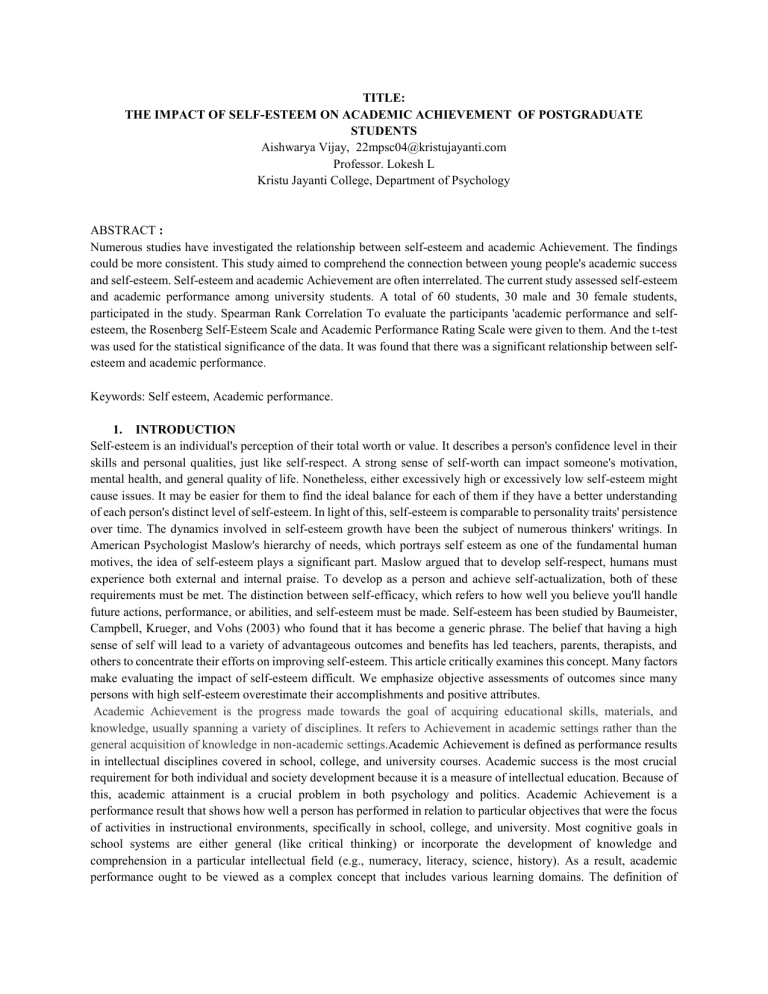
TITLE: THE IMPACT OF SELF-ESTEEM ON ACADEMIC ACHIEVEMENT OF POSTGRADUATE STUDENTS Aishwarya Vijay, 22mpsc04@kristujayanti.com Professor. Lokesh L Kristu Jayanti College, Department of Psychology ABSTRACT : Numerous studies have investigated the relationship between self-esteem and academic Achievement. The findings could be more consistent. This study aimed to comprehend the connection between young people's academic success and self-esteem. Self-esteem and academic Achievement are often interrelated. The current study assessed self-esteem and academic performance among university students. A total of 60 students, 30 male and 30 female students, participated in the study. Spearman Rank Correlation To evaluate the participants 'academic performance and selfesteem, the Rosenberg Self-Esteem Scale and Academic Performance Rating Scale were given to them. And the t-test was used for the statistical significance of the data. It was found that there was a significant relationship between selfesteem and academic performance. Keywords: Self esteem, Academic performance. 1. INTRODUCTION Self-esteem is an individual's perception of their total worth or value. It describes a person's confidence level in their skills and personal qualities, just like self-respect. A strong sense of self-worth can impact someone's motivation, mental health, and general quality of life. Nonetheless, either excessively high or excessively low self-esteem might cause issues. It may be easier for them to find the ideal balance for each of them if they have a better understanding of each person's distinct level of self-esteem. In light of this, self-esteem is comparable to personality traits' persistence over time. The dynamics involved in self-esteem growth have been the subject of numerous thinkers' writings. In American Psychologist Maslow's hierarchy of needs, which portrays self esteem as one of the fundamental human motives, the idea of self-esteem plays a significant part. Maslow argued that to develop self-respect, humans must experience both external and internal praise. To develop as a person and achieve self-actualization, both of these requirements must be met. The distinction between self-efficacy, which refers to how well you believe you'll handle future actions, performance, or abilities, and self-esteem must be made. Self-esteem has been studied by Baumeister, Campbell, Krueger, and Vohs (2003) who found that it has become a generic phrase. The belief that having a high sense of self will lead to a variety of advantageous outcomes and benefits has led teachers, parents, therapists, and others to concentrate their efforts on improving self-esteem. This article critically examines this concept. Many factors make evaluating the impact of self-esteem difficult. We emphasize objective assessments of outcomes since many persons with high self-esteem overestimate their accomplishments and positive attributes. Academic Achievement is the progress made towards the goal of acquiring educational skills, materials, and knowledge, usually spanning a variety of disciplines. It refers to Achievement in academic settings rather than the general acquisition of knowledge in non-academic settings.Academic Achievement is defined as performance results in intellectual disciplines covered in school, college, and university courses. Academic success is the most crucial requirement for both individual and society development because it is a measure of intellectual education. Because of this, academic attainment is a crucial problem in both psychology and politics. Academic Achievement is a performance result that shows how well a person has performed in relation to particular objectives that were the focus of activities in instructional environments, specifically in school, college, and university. Most cognitive goals in school systems are either general (like critical thinking) or incorporate the development of knowledge and comprehension in a particular intellectual field (e.g., numeracy, literacy, science, history). As a result, academic performance ought to be viewed as a complex concept that includes various learning domains. The definition of academic performance depends on the indicators used to quantify it because the field of academic Achievement is quite broad and encompasses a wide range of educational outcomes. Although there is evidence of a relationship between self-esteem and Achievement, some research has failed to discover it in certain populations. For instance, Tashakkori (1993) showed that self-beliefs about connections and social standing were more important predictors of self-esteem than self-beliefs about academic performance in a study of 643 African-American and white adolescents in the rural south. In their examination of data from the National Educational Longitudinal Study in the United States, Ross and Broh (2000) discovered that while self-esteem has no effect on later academic Achievement, a sense of personal control did. Also, it has been established that self-efficacy and personal control are associated. Self-efficacy has been proven to depend on a specific level of favorable selfevaluations (Schunk 1995; Pajares 1996). Many studies have supported the hypothesis that high self-esteem is linked to academic success (Marsh, Byrne, and Yeung 1999), that ability levels may influence depressive symptoms and levels of self-esteem (Humphrey, Charlton, and Newton 2004), and that a positive self-concept is desirable for children's personal development. These studies have drawn on a variety of theoretical perspectives (e.g., social comparison theory, symbolic interaction theory) (Branden 1994). Several researchers have found evidence that self-esteem and teenage academic achievement go hand in hand, although the results are inconsistent between studies and not as well documented as the evidence supporting the reciprocal relationship between academic Achievement and self-concept in particular domains. People with high self-esteem see themselves as capable and active individuals who can encourage change via effort and establish challenging goals that lead to learning new things. It's interesting to note that multiple studies have shown that elevating students' self-esteem is the best approach to boost their academic performance (Rubie et al., 2004). High self-esteem is also linked to academic Achievement, as well as social and personal responsibilities, according to research (Redenbach, 1991). Higher academic Achievement is typically accompanied by a greater sense of selfassurance, while lower Achievement is typically associated with low self-esteem. Similar studies have been conducted among secondary students in various nations, but the primary goal of this study is to determine whether there is a connection between academic Achievement and self-esteem among male and female postgraduate students. 2. REVIEW OF LITERATURE Self-esteem can have a significant impact on academic Achievement. High self-esteem in students can result in better grades, more favorable attitudes towards school, and a greater desire to take on academic difficulties since they are more likely to believe in their capacity to learn and succeed. Nonetheless, students who lack self-confidence may be more inclined to question their skills, experience stress or anxiety, and shy away from academic challenges. This could result in a lack of drive, subpar academic Achievement, and a bad attitude towards learning. Academic Achievement and self-esteem are strongly correlated, according to research. Pupils who have strong selfesteem typically outperform those who have poor self-esteem in the classroom. Additionally, students with high selfesteem are more likely to seek out academic resources, ask questions, and actively participate in class, which can further enhance their academic performance. Among a few previous studies, Frankie Subon (2020), has tried to find the correlation between Academic Achievement and Self Esteem among male and female undergraduate students of a private university in Selangor, Malaysia. The research questions covered, Is there a discernible difference in academic performance between males and females? Do the two sexes' levels of self-esteem differ significantly? Is there a connection between academic Achievement and self-esteem that is meaningful? The Research design was to study the relationship between variables. The participants were students from Selangor University, Malaysia. A total of 120 students participated, 60 of them being male and 60 being female. The research instrument used was the Rosenberg Self Esteem Scale Questionnaire, and the Grade Point Average (GPA) of the present and preceding years were also used. The data analysis was done using SPSS, mainly Spearman's Rho correlation and Independent Sample Test and descriptive statistics that is chi-square were used in data analyses. The results showed that there is a significant difference in Self Esteem between genders, and the relationship between academic achievement and self-esteem. The study's conclusion was that there was a substantial correlation between students' academic success and self-esteem, despite the contradictory results from many other studies. Future research may also use a bigger sample size and consider additional pertinent factors like IQ, motivation, family background, or socioeconomic position to assess their impact on academic success and self-esteem. Similar studies were done by Ying Zhao, Zeqing Zheng, Chenchen Pan and Lulu Zhou,(2021) in China which covered three main questions. How Self-esteem positively predicts adolescent academic Engagement and how Academic selfefficacy mediates the association between self-esteem and adolescent academic engagement. How Perceived social support moderates the relationship between academic self-efficacy and academic engagement. The research was conducted on students of two schools in Hebei, China. 520 students completed the questionnaires voluntarily, and 480 of those gave valid data (92.31%). There were 260 female students (54.2%), and 220 male students (45.8%). Participants ranged in age from 13 to 17 years, with a 14.92 average age. The measure which was used was Rosenberg's Self-Esteem Scale (RSES; Rosenberg, 1965), The assessment of a person's attitudes and ideas about his or her values and talents is known as self-esteem (Rosenberg, 1965). Because of all the changes in teenagers' roles and responsibilities during adolescence, self-esteem is sometimes fragile. According to Trzesniewski et al. (2003), selfesteem often dips in the first few years of adolescence before rising in the middle and later years. High levels of selfesteem in adolescents are associated with better physical and mental health (Li et al., 2010), good self-experiences (Peng et al., 2019), and high-quality interpersonal connections (Cameron and Granger, 2019).The Chinese version of the Utrecht Work Engagement Scale for Students (UWES-S; Gan et al2007) was used, The Chinese version of the Perceived Social Support Scale (PSSS; Yan and Zheng, 2006), The Chinese version of the Academic Self-Efficacy Scale (ASES; Liang, 2000). Data was analyzed with descriptive statistics and a bivariate correlation analysis was conducted. Pearson correlation analyses revealed that self-esteem was positively correlated with academic engagement and academic self-efficacy, and academic engagement was positively correlated with academic selfefficacy. The findings showed a strong correlation between self-esteem and academic engagement, as well as a role for academic self-efficacy as a mediating factor and perceived social support as a moderating factor. Moreover, it was noted that varied degrees of perceived social support had an impact on the mediating role of academic self-efficacy. The main drawbacks was that the cross-sectional survey design used in this study could not verify the causal relationships among variables; a longitudinal design could be used in future studies. Second, only the self reporting method was adopted in this study. While their results showed that there was no serious common method deviation, future research should adopt multiple research methods to collect data, such as the interview method and other evaluation methods that involve other actors (teachers, classmates, and parents). Third, due to the limitations of human and financial resources, only students in Hebei Province were selected for the test. Future research will try to sample from all of China and discuss important demographic information about the participants. Another research was done by Dr. Guneet Kaur Cheema1, Ms.Mangla Bhardwaj (2021), on Academic Achievement and Self Esteem in relation to home environment among adolescents. The objective of the study was to understand how adolescents' family environments relate to their sense of self-worth and academic Achievement.A descriptive survey method was employed. The sample of 200 students were taken. The sample was taken using a random sampling procedure. Self-esteem and academic Achievement are dependent variables, while the family's environment is an independent variable. The statistical tool used was Self esteem inventory(school) by Stanley &Cooper Smith and Home Environment Scale by P A. Akhtar and S. B. Saxena. The statistical technique which was employed was The Pearson product‐moment correlation coefficient. It was interpreted that higher the scores of home environment , higher will be scores of self-esteem; higher the scores of home environment , higher will be scores of academic Achievement. Academic Achievement will correlate with self-esteem scores, which will be greater. As a result, if the adolescent's home environment is supportive, his self-esteem will be higher and he will have more self-assurance to handle life's difficulties and challenges with ease. Preety Sharma and Dr. Manju Sharma (2021), sheds Light On The Relationship Between Self-Esteem And Academic Achievement In Secondary School Students. Also, this study sought to understand the disparities in academic performance between boys and girls. The study uses descriptive research and survey methodology and is analytical and correlative in nature. Students in the 10th standard were given the Cooper Smith (1967) self-esteem inventory, and the achievement scores were taken from school records in order to gather the data. Then, the data were analyzed and interpreted using the appropriate statistical methods. The data was analyzed using Descriptive Statistics, T-Tests And Pearson's Coefficient Correlation Using SPSS For Windows. The major finding of the study was Englishlanguage 10th graders had higher self-esteem than Hindi-language students do. This may be a result of the influence of parents' socioeconomic status, education, and congenial and supportive school climate. Females in the 10th grade had higher self-esteem than boys. This could be a result of the values, attitudes, and beliefs that girls have about themselves because these things contribute to the development of self-esteem. The third finding is that academic Achievement increases with self-esteem. Study on the Self Esteem and Academic Performance among students was studied by Laveena D'Mello, Meena Monteiro , and Nelson Pinto, (2018) The objectives of the study was to investigate the relationship between selfesteem and academic Achievement, to understand the Socio-Economic background, to assess the level of self-esteem, and to know what could be the reason for low academic performance in spite of having high self-esteem. The research design used for the study was descriptive in nature. 50 government school students in all have taken. The population for the current study would be the pupils (aged 13 to 15) enrolled in a high school in the Dakshina Kannada district who had low grades (below 60%) and failed one or more subjects.Sample taken from two private schools (25 each). The sample was chosen using probability sampling's Simple Random sampling methodology. From the population, which has an equal proportion of males and girls, samples are chosen. The finding was that the majority 50% of respondents reported having high self-esteem, 26% reported having moderate levels, and the remaining 24% reported having poor levels. Children that have strong self-esteem do very well and participate in a variety of school activities including contests, athletics, extracurricular activities, etc. They get along well with their friends, meet and chat with teachers, and with the other students, and don't hesitate to introduce themselves to the higher authorities of the school. According to the survey, 76% of students had higher self-esteem despite having subpar academic Achievement. 3. METHOD 3.1 Research Objectives To examine the impact of self esteem on academic performance. 3.2 Samples: The Samples For The Study Consisted of 60 Students, their age ranging from 18-25. Convenience Sampling method was used for data collection. Google forms are used to collect data. Consent was obtained from the participants before responding to the questionnaire. They took 10-15 minutes to answer the questionnaires 3.3 Hypothesis: There would be a positive relationship between self-esteem and academic Achievement among students . 3.4 Variables 1. Self-esteem According to Rosenberg (1965a), self-esteem is one's positive or negative attitude toward oneself and one's evaluation of one's own thoughts and feelings overall in relation to oneself. A person's whole subjective emotional evaluation of their own value is reflected in their self-esteem. Both a judgement of and an attitude towards oneself are involved. (Hewitt, 2009). 2. Academic Achievement In A General Sense, Academic Achievement Is The Current Level Of A Student’s Learning. Academic Achievement is a specified level of attainment or proficiency in academic work as evaluated by the teachers, by standardized tests or by a combination of both. (Dictionary of Psychology by Chaplin ,1959) 3.5 Instruments The Rosenberg Self-Esteem Scale (RSES) questionnaire (Rosenberg, 1965) was employed to obtain the data on the participants’ self-esteem. Academic Performance Scale and Grade Point Average (GPA) in their present and preceding semesters were also taken to obtain the academic performance. The 10 item RSE scale is used to assess self-esteem. The instrument was initially created to gauge high school students' self-esteem. However, since its creation, the scale has been applied to a wide range of populations, including adults, for which norms are available. Scoring can be a little challenging because the RSE is a Guttman scale. Combining ratings is the approach used for scoring. Responses from people with low self-esteem are "strongly disagree" or "disagree" on things 1, 3, 4, 7, and 10, and "agree" or "strongly agree" on items 2, 5, 6, and 8. Things 1, 8, and 10 are scored as individual things, and combined correct replies (If two or three of the three right answers are given for items 3, 7, and 9, then those three items are scored as one or two out of two) to items 2 and 6 are considered to be a single item for items 4 and 5. Items 1, 8, and 10 are scored as individual items. Academic Performance Scale by Christopher McGregory of Saginaw Valley State University. The APS consisted of (8) 5-point scale items. This 5-point scale assessment was carried out by Carson Birchmeier, Emily Grattan, Sarah Hornbacher, and Christopher McGregory of Saginaw Valley State University. For researchers who have a particular interest in academic performance among students, the APS promises to be a useful tool. Scale scores showed adequate internal consistency, 2-week test–retest reliability, and satisfactory concurrent validity. 3.6 Data analysis This study is descriptive in nature. This is a correlational study that measures the relationship between variables. The Data Were Analyzed Using Descriptive Statistics, T-Tests And Pearson’s Coefficient Correlation Using SPSS For Windows. The study was a cross-sectional correlational study. Data handling and statistical analysis was carried out by using SPSS software and Microsoft Excel 2013. These descriptive data were further analyzed according to age, gender and other variables are investigated. 4.1 RESULTS The results are presented based on the research question: whether there is a positive relationship between self-esteem and academic Achievement. Spearman's rho correlation was employed to examine the relationship between students' Self-Esteem and Academic Achievement. All the data obtained from the respondents were computed respectively and the result was generated as follows. Table I Spearman's Correlation between self-esteem and academic Achievement. Self Esteem P value Academic Achievement r p Spearman Rho 0.216* 0.05 Table: I indicate that the results are significant at 0.05 levels. It also shows that there is a strong positive correlation between self-esteem and academic Achievement among university students. It Means That As Self-Esteem Increases, The Academic Achievement Also Increases Linearly And Symmetrically. 4.2 DISCUSSIONS Participants according to self-reported academic Achievement were classified as follows: fail (0.1%), sufficient (2%), good (15.6%), very good (26.7%) and excellent (55.7%). Results showed that the mean value for self-esteem in the study samples was 27.76 (SD=3.47). 26.9 % of the sample were classified with low self-esteem. The aim of the present study was to understand the relationship between self-esteem and academic Achievement among young people. Results showed significant positive correlations between academic Achievement and self-esteem. Other factors that are demonstrated to affect academic Achievement are not yet considered relevant in the assessments of students, for example, regular studying, punctuality in class, self-motivation, availability of teaching and learning materials, and competency of teachers. Nonetheless, this explanation is tentative and further research is needed to examine this proposition. Self-esteem as a culturally based construct, which fluctuates based on specific cultural values and influencing factors. Nevertheless, whether self-esteem has really impacted the students' academic Achievement could not be fully ascertained as past studies also found that academic Achievement can also affect self-esteem. Although there are a variety of opinions on the connection between academic success and self-esteem, some research has shown that self-esteem may also be a reaction to a student's performance in school. Students may automatically feel better about themselves when they receive good grades, thus boosting their self-worth and directly improving their selfesteem. This is ascertained by Ross' and Broh's (2000) self-esteem model which states that adults do better in college when they feel good about themselves than students with low self-esteem. On the other hand, a poor academic achievement can contribute towards a more negative perception of oneself (Osborne, 1995). However, other researchers have different views and findings related to this relationship between self-esteem and academic Achievement. Kohn (1994) claims that there is no definite relationship between self-esteem and higher Achievement. Kohn (1994) also contends that some researchers believe in the causal relationship between self-esteem and Achievement. It is possible in certain situations that students may be feeling good because they are doing well rather than doing well because they are feeling good about themselves (Baumeister & Lipsitt, 2003.). Besides, there are other researchers who also argue that it may not be truly an independent variable that has impacted the relationship because there may be other factors that have increased the level of self-esteem and Achievement, denoting as if there is a positive relationship between the two (Kohn, 1994). Furthermore, past studies also revealed that there are other factors that have also impacted ones' performance, for example, anxiety which surprisingly can lead to positive pushing effect (Kaswadi et al., 2018), or it may be due to occupational or academic settings (McLaughlin, 2015). 5. CONCLUSIONS AND SUMMARY Self-esteem is a person's evaluation of self-worth. It predicts one's belief about oneself. Considering the findings of the current study, it is concluded that a strong positive correlation exists between self-esteem and academic Achievement in university students. From the present data, It can be interpreted that the higher the scores of Self esteem, the higher will be scores of academic Achievement; Finally, it should be mentioned that the present findings should also be considered in the context of their limitations, the most important one being sample composition. Future research might consider other factors such as the socioeconomic or cultural contextual variables in population representative samples. The other cultural aspects are not taken into consideration. However, the magnitude of the relationship between self-esteem and academic Achievement can also be affected by several other demographic variables such as parents' educational background, income, age, learning environment, cultures, and so forth. Taking this into consideration, future research can take any of these demographic variables to be studied in order to obtain more compelling results. REFERENCES: Cherry, K. (2022, November 7). What Is Self-Esteem? https://www.verywellmind.com/what-is-self-esteem-2795868#toc-excessive-self-esteem Verywell Mind. Torres, L. H., Al-Lal, M., & Mohamed, L. A. (2020). Academic Achievement, Self-Concept, Personality and Emotional Intelligence in Primary Education. Analysis by Gender and Cultural Group. Frontiers in Psychology, 10. https://doi.org/10.3389/fpsyg.2019.03075 Subon, F. (2020). Self-Esteem and academic Achievement: The relationship and gender differences of malaysian university undergraduates. IAFOR Journal of Psychology & the Behavioral Sciences 6(1):43-54, 6(1):43-54(6(1):43-54). https://doi.org/10.22492/ijpbs.6.1.03 Zhao, Y., Zheng, Z., Pan, C., & Lulu, Z. (2021). Self-Esteem and academic engagement among adolescents: : A moderated mediation model. Frontiers in Psychology 12, 12(10.3389/fpsyg.2021.690828),https://www.researchgate.net/publication/352105441_SelfEsteem_and_Academic_Engagement_Among_Adolescents_A_Moderated_Mediation_Model Cheema, G., & Bhardwaj, M. (2021). Study of self-esteem and academic Achievement in relation to home environment among adolescents.. European Journal of Molecular & Clinical Medicine, 8(1), 1978-1987. SHARMA, P., & SHARMA, M. (2021). Relationship between self-esteem and academic Achievement of secondary school students. http://ilkogretim-online.org/. https://www.ilkogretimonline.org/fulltext/218-1621787245.pdf Mello, L., Monterio, M., & Pinto, N. (2018). A study on the self esteem and academic performance among students. International Journal of Health Sciences and Pharmacy, Vol. 2,(No. 1), ISSN: 2581-6411. APA Dictionary of Psychology. (n.d.). https://dictionary.apa.org/academic-achievement Park, J., & Park, E. Y. (2019). The Rasch Analysis of Rosenberg Self-Esteem Scale in Individuals With Intellectual Disabilities. Frontiers in Psychology, 10. https://doi.org/10.3389/fpsyg.2019.01992

